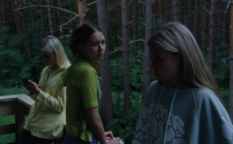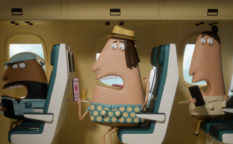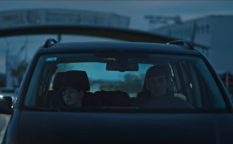Karlovy Vary review: Lynch/ Oz (2022)

The connection between Victor Fleming’s classic The Wizard of Oz (1939) and the cinematic opus of David Lynch is evident, yet not actually properly explored and explained. It feels a bit strange, knowing Lynch’s habit of setting his films in parallel universes (just like Oz), his obsession with curtains (and people ruling behind them) and his many times spoken love and admiration for Fleming’s film. Alexandre O. Philippe, known for his essayistic approach to various topics of cinema from Doc of the Dead (2014) that examined the zombie “culture” in cinema, to his best known 78/52: Hitchcock’s Shower Scene (2017) on the topic of the iconic scene from Psycho (1960), took the task to find, examine and present the connections in his newest work Lynch/Oz that premiered at Tribeca and was recently screened at Karlovy Vary.
After the opening which is a fictional work aimed at paying tribute to Twin Peaks, Philippe sets the pattern that will be followed closely up until the end of the film. The structure is divided in chapters, six of them, each presented by one (in one case, two, but acting as a duo) of the film professionals, whether from the filmmaking line of work or from the critical / theoretic / academic one, each dealing with the different types of connections between the works of David Lynch and Fleming’s film. Stylistically, the chapters are pretty even, based on the off-screen narration and rapid cuts from Lynch’s, Fleming’s and other filmmakers’ works to serve as an illustration to the interesting, usually on the point, but sometimes long shot claims. Lynch/Oz could have ended up as a mere collection of references, theories and proofs, that would present nothing new for the fans of both works, but Philippe is actually interested in something way deeper.
First chapter is titled ‘Winds’ and narrated by the film critic Amy Nicholson, who sets the foundations of the further explorations. Her part is maybe the least spontaneous, the most evidently pre-written and the least personal, but it draws our attention to the recurring details from The Wizard of Oz in Lynch’s films, like the red shoes, the curtains and the wind as the source of mystery, claiming that Lynch (or at least his work) comes from Oz that he saw every Christmas on TV and the small-town Americana he experienced first-hand that is pretty similar to Dorothy’s Kansas.
The rest of the chapters are narrated by the filmmakers. In the next one titled Membranes, Rodney Ascher builds on Nicholson’s foundations, claiming that The Wizard of Oz is so influential that its seeds are planted in pretty much every movie since, that Elephant Man is actually The Wizard of Oz in reverse, and that Lynch’s films could be observed from the simulation theory point of view, highlighting that in Lynch’s works the membranes between the “worlds” are simply thinner than it is the case usually. John Waters gets to narrate the segment called ‘Kindred’ drawing the parallels and pointing to the differences between himself and Lynch in the terms of their works and poetics, but also of the similar upbringing and the nature of obsession with Fleming’s classic. Probably the most personal is the fourth segment called ‘Multitudes’, narrated by Karyn Kusama and revolving around Lynch’s vision of Hollywood portrayed in Mulholland Drive, which she sees as a variation on Judy Garland story. The topic of Judy Garland and her tragic faith is further explored in Benson’s and Moorehead’s fifth chapter simply called ‘Judy’, after which it makes more sense why even the names like Judy, Garland and Dorothy are present among his characters. The final chapter ‘Dig’ is narrated by David Lowery.
Both deep and wide in its scope, masterfully composed, whip-smart, perceptive and nurturing to every cinephile, Lynch/Oz can sometimes feel overwhelming, and even a bit too much, too intellectual, too nitpicky, too whatever. The question is if seeing it as a third or fourth film of the day at a festival is the best way of experiencing it. Like it is the case with other Philippe’s works, the answer is negative, here most obviously so. This is the type of film that would be best enjoyed as the only movie of the day, or maybe even as a series of shorts. Yes, it is that concentrated and intense, for better or for worse.
Country: USA
Language: English
Runtime: 108’
Directed by: Alexandre O. Philippe
Written by: Alexandre O. Philippe
Narrated by: Amy Nicholson, Rodney Ascher, John Waters, Karyn Kusama, Justin Benson, Aaron Moorhead, David Lowery
Cinematography by: Robert Muratore (only prologue)
Editing by: David Lawrence
Music by: Aaron Lawrence
Produced by: Kerry Deignan Roy
Production company: Exhibit A Pictures
Sales by: Dogwoof
















